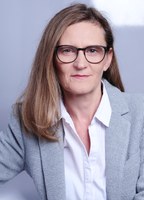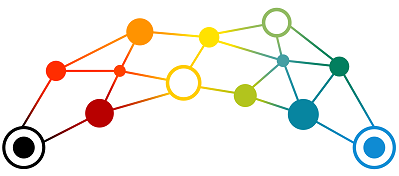
Welchen universitären Hintergrund haben Sie und wie haben Sie Ihren Weg in das StArfrica-Team gefunden?
Ich habe an der Universität in Duisburg Wirtschaftswissenschaften mit dem Schwerpunkt Wirtschaftspolitik studiert und dort anschließend im Bereich Gesundheitsökonomie promoviert. Danach war ich knapp zwei Jahre als Gastwissenschaftlerin an der University of Illinois at Urbana-Campaign (USA). Von 2002 bis 2004 habe ich an einem EU Projekt an der Universität Koblenz-Landau im Fachbereich 4 gearbeitet – inhaltlich ging das Projekt über Geschäftsmodelle in der Musik- und Nachrichtenindustrie. Danach war ich für eine Zeit an der Fachhochschule Kärnten als Lektorin tätig. Ich arbeite mittlerweile mehr als 10 Jahre an der Universität Koblenz-Landau und bin seit mehr als acht Jahren Geschäftsführerin des ZIFET und des Gründungsbüros.
What is your academic background and how did you find your way into the StArfrica team?
I studied economics at the University of Duisburg with a focus on economic policy and then did my doctorate in the field of health economics. Afterwards I spent almost two years as a visiting researcher at the University of Illinois at Urbana-Campaign (USA). From 2002 to 2004 I worked on an EU project at the University of Koblenz-Landau in faculty 4 – the project focused on business models in the music and news industry. Afterwards I worked as a lecturer at the University of Applied Sciences Carinthia. I have been working at the University of Koblenz-Landau for more than 10 years now and have been managing director of ZIFET and the founding office for more than eight years.
Seit wann sind Sie dabei, was sind Ihre Aufgaben und welche Erfahrungen bringen Sie mit?
Ich habe von Anfang gemeinsam mit Professor von Korflesch an dem Antrag StArfrica gearbeitet und unterstütze das Projekt im organisatorischen, administrativen und konzeptionellen Bereich. Durch meine Arbeit im Gründungsbüro und durch die Leitung von zwei großen EXIST-Projekten bringe ich zum einen Erfahrung in Bereich „Existenzgründung aus der Wissenschaft“ mit und auch den Bezug zu Afrika, da das ZIFET ein weiteres Projekt in Marokko hat und auch schon in den letzten Jahren gemeinsam mit dem Ruanda-Zentrum und Büro für Afrika-Kooperationen der Universität Koblenz-Landau Aktivitäten in Ruanda durchgeführt hat. Mit meinen Erfahrungen in den USA und in Österreich und den internationalen Projekten habe ich über die Jahre viel interkulturelle Erfahrung machen können und durch meine langjährige Arbeit im Gründungsbüro und im ZIFET an der Universität hat sich zudem ein großes Netzwerk ergeben.
When did you join the project, what are your tasks and what experience do you bring with you?
I have been working on the StArfrica application together with Professor von Korflesch from the beginning and support the project in the organizational, administrative and conceptual areas. Through my work in the founding office and through the management of two large EXIST projects, I have experience in the area of “Business Start-ups from Science” and also have a connection to Africa, since ZIFET has another project in Morocco and has already carried out activities in Rwanda in recent years together with the Rwanda Center and Office for Africa Cooperation of the University of Koblenz-Landau. With my experience in the USA and in Austria and the international projects I have been able to gain a lot of intercultural experience over the years and through my many years of work in the founding office and in ZIFET at the university a large network has also been established.
Wie hat das Pilotvorhaben Ihr Interesse geweckt? Was ist Ihre Motivation, daran teilzuhaben?
Ich war von Beginn an dabei, als wir uns im ZIFET dazu entschlossen haben, Aktivitäten in Ruanda zu entwickeln. Die Wahl fiel auf Afrika, ein spannender und vielversprechender Kontinent, der großes Potenzial birgt. Es gab schon Kontakte nach Ruanda durch die vorherigen Aktivitäten gemeinsam mit dem Ruanda Zentrum, so dass die Wahl von Ruanda als Partnerland im Antrag naheliegend war. „Existenzgründung aus der Wissenschaft“ an der University in Rwanda zu etablieren ist für mich ein sehr spannendes und herausforderndes Projekt, das ich mit meinen Erfahrungen gerne begleite.
How did the pilot project arouse your interest? What is your motivation to take part in it?
I was involved from the beginning when we at ZIFET decided to develop activities in Rwanda. We chose Africa, an exciting and promising continent with great potential. There were already contacts to Rwanda through previous activities together with the Rwanda Center, so the choice of Rwanda as a partner country in the application was obvious. Establishing “Business Start-Up from Science” at the University of Rwanda is a very exciting and challenging project for me, which I am happy to accompany with my experience.
Was verbinden Sie mit Ruanda? Waren Sie schon einmal in dort? Wenn ja, welche Erfahrungen haben Sie gemacht? Was hat Sie überrascht/erschreckt/begeistert? Falls nicht: Haben Sie vor, nach Ruanda zu reisen und wenn ja, was erhoffen Sie sich? Was zieht Sie an, was sind Ihre Erwartungen?
Ja wie gesagt, ich war im Rahmen meiner Tätigkeit schon zweimal in Ruanda. Es ist ein wunderschönes und ein sehr sicheres Land und es ist das Partnerland von RLP. Die Menschen vor Ort sind aufgeschlossen und bzgl. der Thematik Existenzgründung sehr interessiert. Ruanda versucht in diesem Bereich gerade in Ostafrika eine führende Rolle einzunehmen, politisch wird dies aktiv vorangetrieben. Entrepreneurship spielt in allen Bereichen und insbesondere an der University of Rwanda eine wichtige Rolle, sodass wir mit unserem Projekt gerade zum richtigen Zeitpunkt kommen.
What do you associate with Rwanda? Have you ever been there? If so, what experiences have you had there? What surprised/frightened/enthused you? If not: Do you plan to travel to Rwanda and if so, what do you hope to achieve? What attracts you, what are your expectations?
Yes, as I said, I have been to Rwanda twice in the course of my work. It is a beautiful and very safe country and it is the partner country of RLP. The local people are open-minded and very interested in the topic of business start-ups. Rwanda is trying to take a leading role in this area, especially in East Africa, and this is being actively promoted politically. Entrepreneurship plays an important role in all areas and especially at the University of Rwanda, so our project comes at just the right time.
Welchen Erfolg wünschen Sie sich für das Projekt StArfrica?
Zunächst wünsche ich mir ganz pragmatisch, dass wir unsere angestrebten Ziele, über die wir uns sehr viele Gedanken gemacht haben, erreichen. Dieses Projekt ist so geplant, dass es Impact für Rwanda und die Startups dort vor Ort hat, gleichzeitig aber auch positive Impulse für Deutschland bringt; für beide Länder soll eine Win-Win Situation entstehen. Wenn wir es schaffen, Startups aus der Wissenschaft in Rwanda auf eine innovative Gründung mit Blick auf den deutschen Markt vorzubereiten, dann wäre dies ein großer Erfolg.
What success do you wish for the StArfrica project?
First of all, I pragmatically hope that we will achieve our goals, which we have given a lot of thought to. This project is planned to have an impact on Rwanda and the local start-ups there, but at the same time it should also provide positive impulses for Germany; a win-win situation should be created for both countries. If we manage to prepare science start-ups in Rwanda for an innovative start-up with a view to the German market, this would be a great success.
